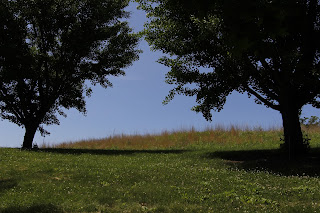From shortly after Kevin's diagnoses, I cried. I tried not to cry in front of him too often, I didn't want him to worry about me (though I now think this was a mistake and that's a topic for a whole other post) nor did I want him to think I had given up on him, but I cried. A lot. When he died I learned that I could cry with such abandon that I would not be able to stand or even sit up straight. Sometimes I cried so hard I would have to stop before I vomited. I didn't always stop in time.
As time passed I cried less. More time would pass between the big bouts of tears and even those began to diminish in intensity. Now I cry infrequently and when I do it's almost always a momentary shower, not the overwhelming storm.
All of this is okay, it's all part of what happens for me in grief. Your experience may be different but for me it was important to let myself cry. I didn't want to bottle it up, which is what not crying would have been for me.
For the last few months, really since the anniversary of Kevin's death, I've been down. Not like I was, I can function and most of the time I feel okay, but I've been aware of more grief and sorrow in my body and spirit than I had felt in some time. This, too, is okay because grief is an unpredictable tide. This period of greater grief has been puzzling to me, however.
I learned how to manage the great waves. I learned to let myself succumb to them and just feel whatever it was I was feeling. I think part of why I am where I am is because I didn't fight it, I felt it. Now, over two years out (unbelievable) I find myself again in new territory. The world is no longer barren as it once was, but it
is unfamiliar. I often think that I am living in a parallel universe where everything is almost but not quite like my old universe.
There have been times when I didn't realize grief was looming large (though it's never entirely gone) but this time I knew it was there, I just didn't know what to do with it. I've been writing in my journal, nesting, doing all the things that have helped before, but my mood has remained the same; not terrible, but not good either. I've been describing it as
cranky.
I kept thinking a good cry would help. I've cried a little in the last few months, but never enough to burn off some of the sorrow. I would sniffle and it would stop, even when I gave myself clear permission to let go. I find this frustrating and upsetting, wondering if it's somehow a comment on how much I love Kevin. I know that makes no sense but the doubt creeps in, maybe because of the lack of models for what healthy long-term loss looks like, though that's a whole other conversation, too.
Sometimes we have to cry. Sometimes we need to just let the feelings wash over us and see who we are once the storm has passed. Since the storm wasn't coming for me, I went looking for the storm.
I don't know about you, but every once in awhile I stumble across a piece of art that says more about what it is to be human than I ever could. Sometimes it's a painting, a piece of music, a story or a book. And every once in a while, very rarely, it's a television show. The last one that really did it for me was
Six Feet Under. If you haven't watched it some of what follows won't make any sense to you, so please forgive me. Check out the link above if you'd like. I'll be here when you come back.
I didn't realize I was looking for the storm until a friend posted the finale of Six Feet Under on Facebook. I sat there, looking at the post for a long time before I clicked play. I knew what would happen. If you have seen it then you know, too. I'm not including the video in this post because a) if you know the show it will make you cry and b) if you don't know it then it pretty much spoils the preceding five seasons, but if you want to see it
go here.
Within two or three seconds tears were streaming down my face and soon enough I was shaking with sobs. It was exactly what I needed. Right now, as I write these words, I am tearing up again. The floodgates are open and that is fine. As my body shudders with sorrow I also remember the love. I am able to forgive myself for the tears shed and those hidden. I am wholly in this moment instead of suspended between life and sorrow.
Crying is not a weakness. It is a way to express our very real feelings and move through them to whatever comes next. I have cried rivers. Sometimes we have to. Those rivers are carrying me to new lands; to new ways of understanding the world; to a new kind of relationship with grief, with life, with love, and with Kevin.
(c)2016 Laura S. Packer




















